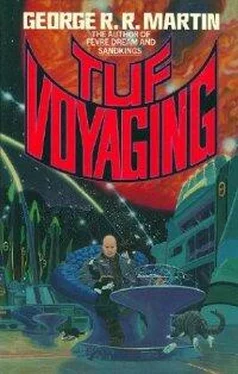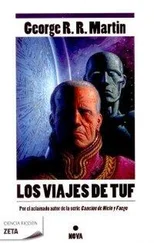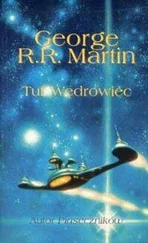“First Moses turned the waters of the river into blood,” said Haviland Tuf.
“It was disgusting,” the younger woman said. “All the water in the arcology, the fountains, the swimming pools, the taps. You turned on the faucet or stepped into the shower and suddenly you were covered with blood. Even the toilets were full of blood.”
“It wasn’t real blood,” Jaime Kreen added. “We analyzed it. Some organic poison had been added to the city water supply. But whatever it was made the water thick and red and undrinkable. How did you do it, Tuf?”
Haviland Tuf ignored the question. “The second plague was a plague of frogs.”
“In our yeast tanks, and our whole hydroponics section,” said Kreen. “I was the supervising administrator. It ruined me. The frogs gummed up all the machinery with their bodies, and they died and rotted and spoiled the food. Laithor gave me a summary discharge when I couldn’t contain them—as if it was my fault!” He grimaced at his former superior. “Well, at least I didn’t wind up slaving for Moses. I left for K’theddion when it was still possible to leave.”
“Third,” said Haviland Tuf, “was the plague of lice.”
“Everywhere,” muttered the former fat man. “Everywhere. They couldn’t live inside the system, of course, so they died there, but that was bad enough. The system went down. The lice just moved on. Everybody had them. You couldn’t stay clean enough to avoid it.”
“Fourth was the plague of flies.”
The Charitans all looked glum. No one said anything.
“Fifth,” continued Haviland Tuf, “Moses set loose a murrain that killed all the cattle of his enemies.”
“He skipped the murrain,” said Rej Laithor. “We had our herds out on the prairies, but we put guards around them, and down in the cellars around the meatbeasts, too. We were expecting him. Nothing happened. He skipped the boils, too, thank goodness, and the hail. I would have liked to have seen him make it hail inside the arcology. He went straight to the locusts.”
“Indeed,” said Haviland Tuf. “The eighth plague. Did these locusts eat your fields clean?”
“The locusts didn’t touch our fields. They were inside the city, in the sealed grain storage compartments. Three years’ worth of surplus was gone overnight.”
“The ninth plague,” said Haviland Tuf, “was darkness itself.”
“I’m glad I missed that one,” volunteered Jaime Kreen.
“Every light in the city died,” said Rej Laithor. “Our repair crews had to fight through piles of dead flies and live locusts, scratching at their lice all the while. It was hopeless, and the people were already leaving by the thousands. I ordered the city abandoned once it became clear that even the secondary power stations were full of bugs. After that, everything went very fast. A week later I was living in an unheated cabin in the Hills of Honest Labor, and learning how to operate a spinning wheel.” Her tone was savage.
“Your fate is a sad one,” Haviland Tuf agreed in a placid voice. “Yet you should not despair. When I heard of your plight from Jaime Kreen, I resolved at once to help you. And here I am.”
Rej Laithor looked suspicious. “Help us?” she said.
“I will win back your City of Hope for you,” said Haviland Tuf. “I will smite Moses and his Holy Altruistic Restoration. I will free you from your spinning wheel and give you back your vocoder.”
The young woman and the former fat man were beaming. Rej Laithor continued to frown. “Why?”
“Rej Laithor asks me why,” Haviland Tuf said to Dax, stroking the cat softly. “My motives are always imputed. People have no trust in this hard modern age, Dax.” He looked at the top administrator. “I will help you because the situation on Charity moves me, because your people are obviously in pain. Moses is no true altruist, as we both know, but this does not mean the impulse to self-sacrifice and benevolence is dead in humanity. I deplore Moses and his tactics, his use of innocent insects and animals in an unnatural manner to impose his will on his fellow human beings. Are these motives sufficient for you, Rej Laithor? If not, say as much, and I will take my Ark and depart.”
“No,” she said. “No, don’t do that. We accept. I accept, on behalf of the City of Hope. If you succeed, we will build a statue to you, and set it atop the city to be seen for kilometers.”
“Passing birds would relieve themselves upon such a statue,” said Haviland Tuf. “The wind would abrade and erode it, and it would be placed too high for any to see its features clearly. Such a statue might tickle my vanity—I am a small man, for all my size, easily pleased by such things—but I would want it set in your largest public square, safe from all harm.”
“Of course,” Laithor said quickly. “Anything.”
“Anything,” said Haviland Tuf. It was not a question. “In addition to the statue, I will also require fifty thousand standards.”
Her face went pale and then red. “You said,” she began in a sort of a choked whisper. “You . . . benevolence . . . altruism . . . our need . . . the spinning wheel . . . ”
“I must meet my expenses,” said Haviland Tuf. “Certainly I am willing to donate my own time to this matter, but the resources of the Ark are too valuable to squander. I must eat. Surely the coffers of the City of Hope are sufficient to meet this small sum.”
Rej Laithor made a sputtering noise.
“I’ll handle this,” Jaime Kreen interjected. He turned to Tuf. “Ten thousand standards. No more. Nothing. Ten thousand.”
“Impossible,” said Haviland Tuf. “My costs will surely exceed forty thousand standards. Perhaps I can diet for a time, take only that sum, and content myself with a small loss. Your people do suffer.”
“Fifteen thousand,” Kreen said.
Haviland Tuf said nothing.
“Oh, hell,” said Jaime Kreen. “Forty thousand then, and I hope that damned cat dies of gout.”
It was the habit of the man called Moses to walk each evening along the rugged footpaths of the Hills of Honest Labor, to watch the beauty of the sunset and contemplate in solitude the problems of the day. He would stride along briskly at a pace few younger men could match, his long crooked staff in hand and a peaceful look on his face, his eyes fixed on far horizons. Often he would cover a dozen kilometers before turning back toward home and bed.
The pillar of fire first appeared to him on such a walk.
He had just topped a rise and there it was—a twisting, writhing funnel of orange flame, shot through with flickers of blue and yellow, tracing a path through the rocks and the dust straight toward him. It was easily thirty meters high, crowned by a small gray cloud that somehow paced it.
Moses rested on the crest of the hill, leaning on his staff, and watched it come.
The pillar of fire stopped five meters from him, on slightly lower ground. “Moses,” it said in a booming thunderous voice from above, “I am the Lord God, and you have sinned against me. Give my people back! ”
Moses chuckled. “Very good,” he said in his rich tones. “Really, very good.”
The pillar of fire trembled and spun. “Release the people of the City of Hope from your cruel bondage,” it demanded, “lest in my wrath I bring down plagues upon you.”
Moses scowled and pointed his staff at the pillar of fire. “I am the one who brings down plagues around here, I would thank you to remember.” There was a hint of irony in his voice.
“False plagues from a false prophet, as both you and I know full well,” boomed the pillar of fire. “All of your feeble tricks and travesties are known to me, the Lord God whose name you have profaned. Give my people back, or you shall look upon the terrible face of genuine pestilence!”
Читать дальше












